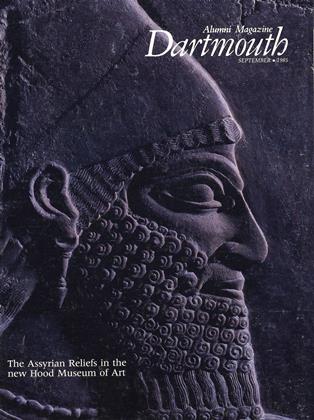Several hundred journalists, business leaders, and educators gathered last May for lunch at the Plaza in New York to observe the presentation of the Champion Tuck Awards to 81 writers and broadcast journalists from across the country. The prestigious national competition that brought them together is now in its eighth year of recognizing outstanding print and broadcast reporting that improves the public's understanding of business and economic issues.
Administered by Dartmouth's Tuck School and sponsored by Champion International Corporation, the program awarded nearly $100,000 in prize money in 13 categories this year. A panel of distinguished judges representing media, business, labor, and education determined the winners. Among the award recipients was Lucien Rhodes '65, who won a $5,000 first prize for an article on People's Express airline that appeared in Inc. magazine.
"Once again, this year's winning entries were an accurate reflection of the major concerns of the country," said Tuck Dean Colin Blaydon in presenting the awards. "They covered a broad range, from the farm crisis to the high cost of health care to the plight of the homeless. While the subjects were varied, they shared a common thread—eloquence and comprehensibility."
Andrew Sigler '53, chairman and chief executive officer of Champion International, noted, "The economic affairs of this country . . . seem to become more complicated every year. We should all be grateful to the winners of today's awards for their diligence in explaining these complex issues. It seems to me economic reporting in this country is vastly better than it was a decade ago."
This year's guest speaker at the awards program was Charles Osgood of CBS News, who regaled the audience with some wry reflections on the state of broadcasting today. "Any time you report on a subject that is important or controversial and usually important subjects are controversial because people care about them," he told the group, "you'11 find that no matter how many facts and factoids [facts subject to varying interpretation] you may have in there, both sides will accuse you of having left out what they regard as the 'true' facts, unless you state the case exactly as they would state it in a press release. People in politics, in business, in religion, in anything want you to see things their way and any variation is proof, in their view, that you are being biased."
 View Full Issue
View Full Issue
More From This Issue
-
 Feature
FeatureFrom "a few curious Elephants Bones" to Picasso
September 1985 By Jacquelynn Baas -
 Feature
FeatureCONJUNCTIONS, CONFLICTS & CHALLENGES
September 1985 By Charles W. Moore -
 Feature
FeatureJourney's End: The Assyrian Reliefs at Dartmouth
September 1985 By Judith Lerner -
 Feature
FeatureDingwall of Dartmouth
September 1985 By Fritz Hier '44 -
 Cover Story
Cover StoryBack on the Wall (where they belong)
September 1985 By Georgia Croft -
 Sports
SportsMany Sighs and Many Tears
September 1985 By Jim Kenyon
Article
-
 Article
ArticleJUDGE WILLIAM MARTIN CHASE '58
November 1917 -
 Article
ArticleTask Force Recommendations on Budget Priorities
JUNE 1973 -
 Article
ArticleThe Truth, The Half Truth, and Nothing of the Truth
NOVEMBER 1997 -
 Article
ArticleThayer School
October 1959 By EDWARD S. BROWN '35 -
 Article
ArticleThe Time Allotted Us
June 1994 By James O. Freedman -
 Article
ArticleThe Undergraduate Chair
FEBRUARY 1972 By MARK HELLER '70

